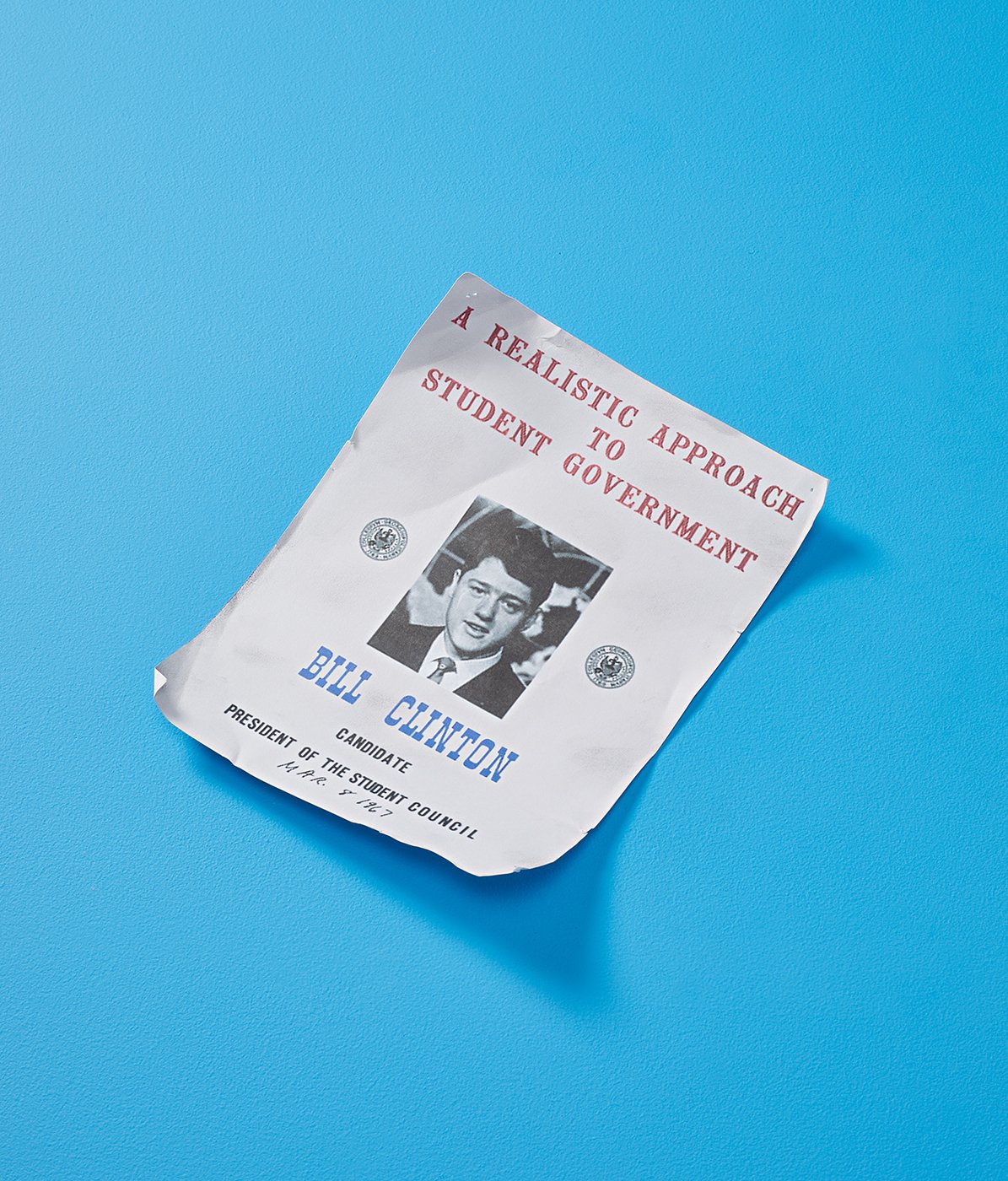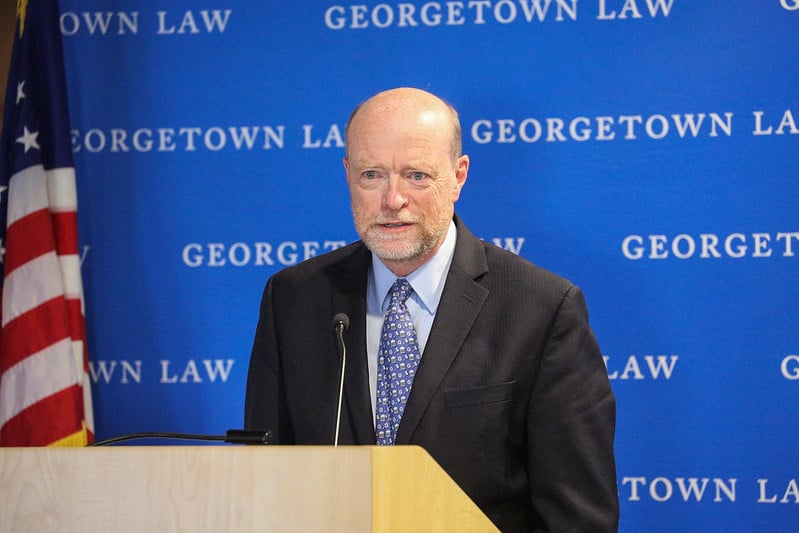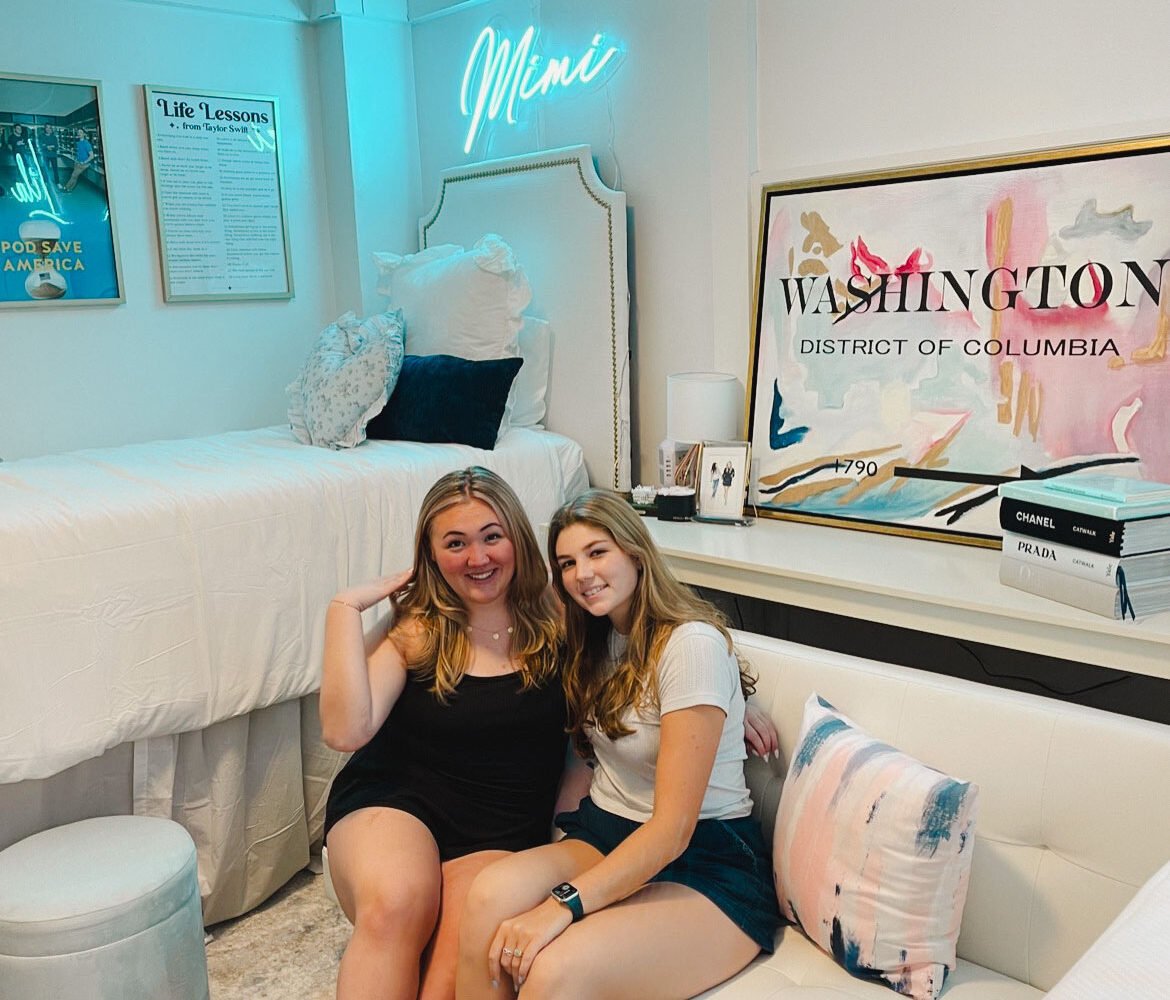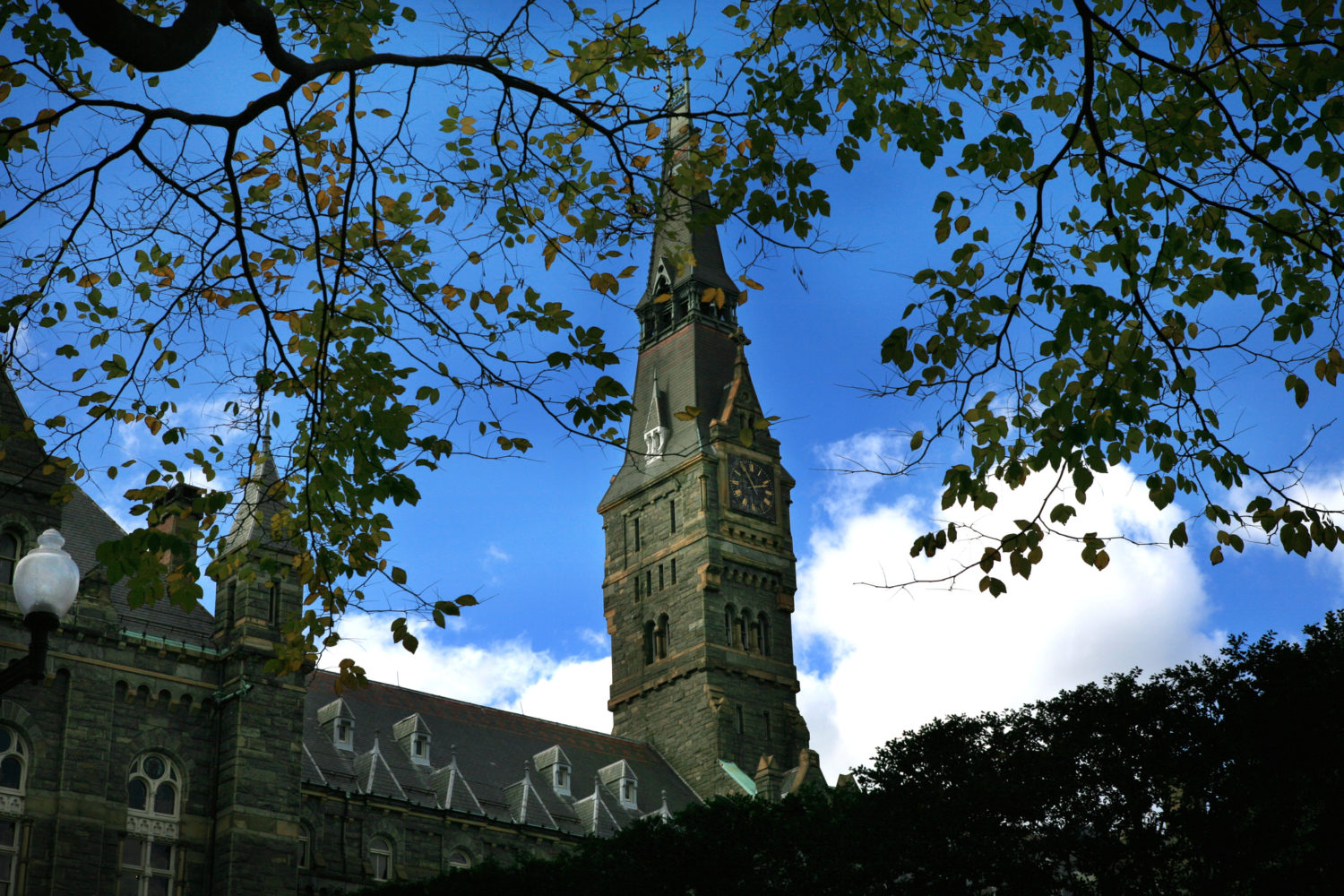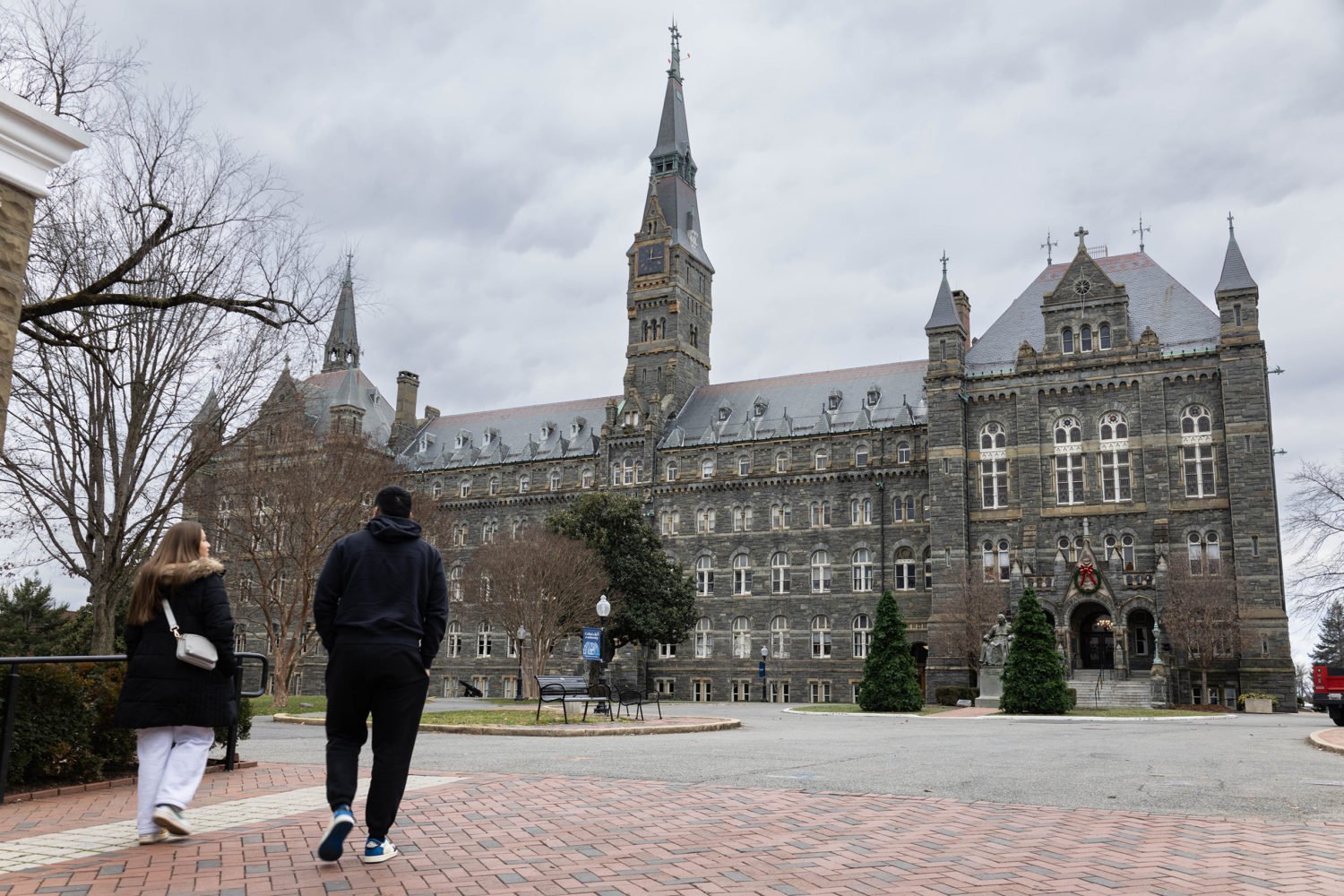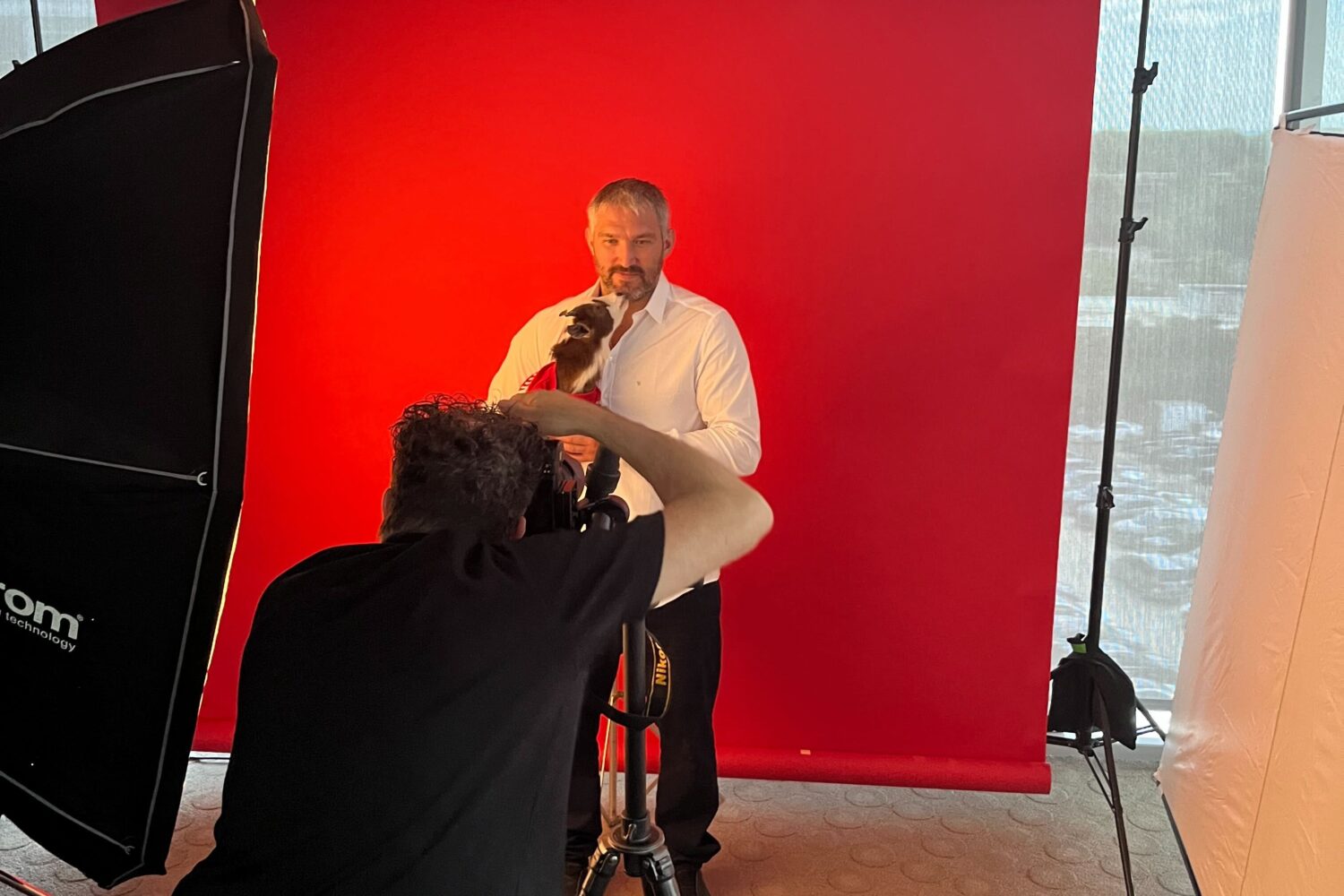This past winter, the race to become Georgetown’s student government president had spooky echoes of the 2016 U.S. presidential election: an insider ticket that failed to inspire versus a pair of bombastic outsiders—frat boys running to defund the school’s noise complaint cops and overturn its mask mandate—who ostensibly didn’t have a chance. The election devolved into a series of mini-scandals, including a beer-for-votes debacle, an election certification crisis, and a spoof campaign by a Star Wars villain. I wrote about it for our October issue.
Ordinarily, we wouldn’t cover a student government election, but this one felt relevant because Georgetown is a pipeline to powerful government positions. The students involved might someday become our leaders—like Bill Clinton, Justice Antonin Scalia, White House chief of staff Ron Klain, Senator Lisa Murkowsi, former CIA director George Tenet, and Congresswoman Pramila Jayapal, who are all Georgetown alums.
To understand the history of Georgetown’s student government—and how it helped prepare Bill Clinton for future office—I spoke with Terry Modglin, who beat Clinton to become Georgetown’s student president in 1967. After Georgetown, Modglin served in Vietnam, worked as a Congressional staffer on the Hill, ran for state office four times (unsuccessfully) in Virginia, and worked in nonprofits devoted to youth and municipal crime prevention. He now lives in Seven Corners, and he still talks to Bill Clinton.
How early in your time at Georgetown did you meet Bill Clinton?
Oh, you couldn’t not meet Bill Clinton. He made it a point to meet everybody. A lot of people felt he was running for student body president the day that he stepped on campus, and I think that’s probably true. I met him our freshman year. Bill was the freshman and sophomore class president, and I was the sophomore class vice president. We worked together on a number of things in the student council.
Was it clear from the beginning that Clinton had national ambitions?
Well, there were a lot of us who had ambitions. People ask me, “Did Bill Clinton at the time want to be president of the United States?” and I’m like, Yes, but so did 30 other guys in the class. I mean, one of the reasons we went to Georgetown was for that reason, right? You were at the political heart for future national ambitions.
Many future political leaders came out of those classes. So for example, Frank Keating—who was the governor of Oklahoma, and probably should have been the Attorney General under George W. Bush—was the president of the college student council two years earlier. Bill Price, who was on the council and supported me in [running for student president in 1967], ended up as a U.S. Attorney in Oklahoma. Dick Durbin, now Senator Durbin, was at the law school. And Gloria Arroyo, later the President of the Philippines, supported me in that election. We also had a guy in the class who was one of the hostages in the Iran hostage crisis. So if you were, in a word, to characterize student politics, it was serious.
Oh, so it wasn’t seen as silly roleplaying or anything?
Let me tell you how serious it was; it was so serious we that we had a big speaker coming to campus, to Gaston Hall, the main auditorium—800 people can be in there. And the guest speaker, a guy named Mel Elfin who was the editor of Newsweek, was expecting a large crowd. We went to the guy who was in charge of the event and said, “Do not hold this event because Modglin and Clinton are having a debate that night, nobody’s going to come.” And sure enough, the guy shows up and there’s, like, three people in the hall.
Someone who worked for me got the assignment of going there and greeting Elfin with three people there. Oh my god. Needless to say, Georgetown did not get a lot of favorable publicity in Newsweek for quite a while. The university had to repair that for 10 years. But we told them to cancel that event because everybody’s interested in this election. That’s how serious it was.
Tell me about the 1967 campaign—the one where you ran against Bill Clinton.
I decided early in my junior year that I was going to run for student council president. Those campaigns lasted almost a whole year, and I started by keeping three-by-five note cards on, like, 500 people whom I wanted to proselytize to ultimately vote for me. This was meticulous, believe me.
The campaign was 24/7. We had a campaign headquarters on the bottom floor of a house [in Georgetown]. There’s no way I could have won without all the students who helped me. One guy flunked his class because I had asked him to stay up all night making signs for Election Day. And then my girlfriend, she was number one in the class, but she lost the standing and became number two because of all the time that she devoted [to my campaign].
My campaign was called the “Modge Rebellion.” At the time, there was a national [advertising] campaign called the “Dodge Rebellion.” And the Dodge Rebellion was characterized by nice-looking girls with white cowboy hats. So what did we do? I got these good-looking girls to don the white hats and be in the lobby.
What issues were you and Bill Clinton running on?
Student power was a big issue for me. Mario Savio was the student leader at Berkeley who was the student power candidate. So student power efforts were going on, and I wanted to be in that vanguard, if you will.
For Bill, it was more based on personality. Bill was a charmer. He was the number one charmer of all time, believe me, and he was really running on the strength of his reputation. He had been president of the class for two years, which in a way rebounded on him, because that established him as the establishment candidate and me as the underdog candidate. And as Bob Dylan said, the times were a’changing, right? This was 1967, there was ferment just about to begin, and that whole student power thing was beginning to entice people.
Yeah, could you speak a little bit to the national environment and how that affected student government?
Well, number one, you had the war on poverty, so a lot of people got involved in service to the poor. The Vietnam War was certainly there. By ’66 or ’67, there was some discontent with the war, but that was still, I think, a minority of people.
During the election, the social awareness of people power was taking hold. And Bill’s campaign did not capture that, at least in comparison. He largely ran on his personality and good relationship with the administration. And my deal was, you know, we’ll reckon with the administration, but with solidarity of students.
Why do you think you won that election?
One thing is that I started a little bit earlier, because Bill was consumed with a lot of things on the Hill in his work for [Arkansas Senator J. William] Fulbright. That made a big difference.
But the number one reason was the large number of great student leaders who supported me. I think they regarded me as the candidate of substance, as opposed to just charming people and being the best sweet-talker in the room—or really in the city. Bill still is, he’s so good. But I was a serious candidate who had very specific platform issues—I had 35 planks or whatever in the platform.
So it sounds like Clinton’s famed interpersonal skills may have been something of a liability in this campaign.
Yeah, his interpersonal skills were probably better than anybody else. But as a result of that, some people did not like him because they regarded him as a phony because he was a schmoozer. And there was a feeling that Bill was punching a ticket here on his way to the top—as opposed to, Modglin, who was all in. So that sentiment was real, and that had an effect, definitely.
One other deficit that turned into a positive for our campaign is that there used to be a gathering around the John Carroll statue, which is the principal statue on campus, to pray for peace in Vietnam. Now, I was in ROTC, I had no problem supporting our troops in Vietnam and also praying for peace—the Pope said pray for peace, right? So I joined some of those prayer groups. And Bill’s guys—not really Bill, but his guys—attacked me about, you know, being a disloyal person. They wanted to get me branded as a leftist.
Well, that backfired on them, because then all the the SDS guys and the guys who were radical and demonstrating on campus on various issues ended up supporting me. I was labeled the disgruntled radical candidate, so all of a sudden I got that support. And I’m like, how the hell did I get SDS support when I’m in support of our involvement in Vietnam?
I read in Clinton’s autobiography that there was a scandal involving campaign signs.
So, at the end of the campaign, we had this issue about signs being torn down. We had people 24/7 on the watch—people were staying up helping me, and some of my guys saw some of their guys tearing down my signs and throwing them into the Potomac. Now, Bill in his biography says kind of the opposite, that they thought we were tearing down their signs. But I have no reason to believe them.
So that’s when we ended up asking for a meeting of the elections committee to disqualify Bill, which they didn’t. But that was one of the reasons that I won, is because when that happened, the election committee would not disqualify him or even fine him or anything else, so I sent my guys out into the lobby—the guys who had kind of the biggest mouths, if you will—and talked up the fact that we were being essentially persecuted, we were being unfairly dealt with by his campaign. That was turning a deficit into a positive for us.
Why wouldn’t the election committee do anything about the sign issue?
Disqualifying Bill would have been a volcanic incident on campus, believe me. Because he was the man, right? And he testified that he did not know anything about it, and I think it’s possibly true that he did not know about it, that his guys just did it.
What was it like when Clinton lost?
He was very surprised when he lost. He thought he was going to win right until the end. He really did, until the votes were counted. There were tears and so on. But I think it taught him a lesson that he never forgot, which is that you don’t take anything for granted, you campaign to the end. And if you remember, in his ’92 campaign, he lost his voice because he spoke in 13 different places the last day. So he never took an election for granted after that.
Did you support Clinton when he ran for President of the United States?
I’ve always been a maverick sort of guy, never necessarily voting for Democrats or Republicans—many times I voted for a third party for the presidential elections. But I did vote for Bill both times, even though I think George H.W. Bush was a great president.
What was it like to see your former classmate become president?
I would just say that you’re talking about a guy who is—I mean, I borrowed his notes one time for a class. A lot of us would do bullet points and stuff. Well, Bill had the lecture organized into Roman numeral one, sub A, sub-sub A, little-a-sub-one. His mind is that sharp and his memory is that sharp. I’ve talked to him recently—he remembers things about school to a T, incredible intelligence.
They don’t put him in the top five of intelligence for presidents, but that has to be wrong. He’s a very, very intelligent guy. But he has some fatal flaws. You know, when they asked about Lewinsky, they said, “Why did you do this?” And he said, “Because I could.” I think power corrupts.

